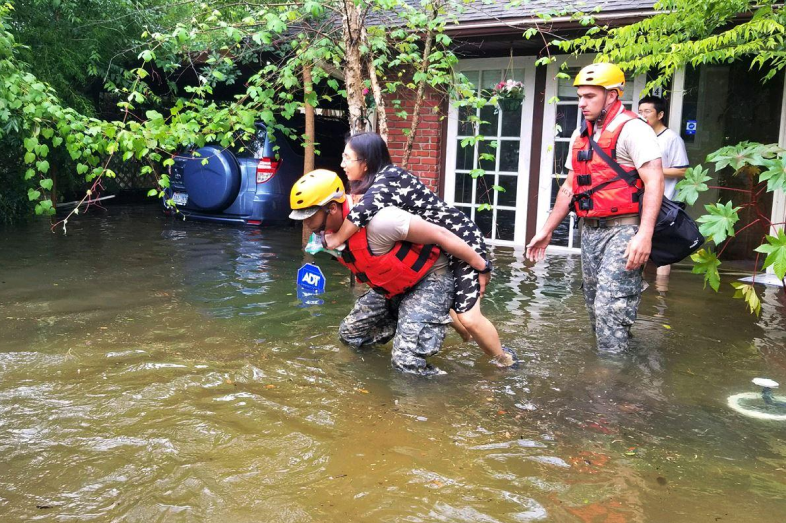

Hurricane Harvey has pummeled Texas, with the greatest concentration of flooding in the Houston area. Local school districts that had intended to kick off the new academic year this week are instead assessing the damages to campuses, and preparing to help students and families displaced by the storm.
As The Washington Post put it, this is a “disastrous start to the school year.”
Universities in the Houston area are also delaying the start of classes, as some campus facilities serve as temporary shelters for displaced residents. Dozens of K-12 schools have also become sanctuaries from the storm.
Meanwhile, the U.S. Department of Education has activated an emergency communications network, intended to help affected K-12 and higher education systems gain quick access to information about federal support and resources.
A number of EWA member journalists are on the front lines of this story. Some have been working nearly around the clock since the hurricane made landfall late last week. That includes The Houston Chronicle’s Shelby Webb, who camped out in the newspaper’s office over the weekend. (Also, listen to Webb share her first-hand observations about Harvey’s educational impact on EWA Radio.)
Was scheduled to leave ~10 or 11 p.m., but that’s becoming less and less of an option. Good thing I packed my hammock and sleeping bag!
— Shelby Webb (@shelbywebb) August 27, 2017
As U.S. News & World Report’s Lauren Camera noted, Houston Public Schools Superintendent Richard Carranza said an immediate concern is making sure students have what they need when classes eventually resume.
“Students went back-to-school shopping for school uniforms and clothing and school supplies,” Carranza said. “Even the amount of flooding that’s happened, many of our students are going to have lost everything.”
Federal Aid for Homeless Students
Students displaced by the hurricane are protected by the federal McKinney-Vento law, designed to help homeless students. Education Week reporter Daarel Burnette spoke with an expert on this:
“The disaster is traumatic, and homelessness is traumatic,” said George Hancock of the National Center on Homeless Education. “As they’re displaced, we wouldn’t want to then further exacerbate the situation. We want them to get back into their schools as quickly as they can so they can be in a stable and nurturing environment. The hope is to get at least one part of their lives back to normal.”
It’s too early to gauge the full extent of the damage to local schools, as reporter Matt DeGrood explained in the Daily News in Galveston County. But there are long-term concerns over how school districts and cities will help students and families in the weeks, months — and even years — ahead.
After Hurricane Katrina, many families with school-aged children were evacuated to other cities, including Houston. The New Orleans school system was eventually reconstituted with a new governance model, and most of the traditional public campuses were replaced by charter schools. And, as Denisa Superville reported for Education Week on the 10th anniversary of Katrina, some New Orleans students never returned.
Texas education reporter Lauren McGaughy also marked the 10th anniversary of Katrina back in 2015 with a focus on how post-traumatic stress disorder had affected the hurricane’s survivors. The piece, reported for The Houston Chronicle, is sadly even more relevant now, as many New Orleans residents made their new homes in that city.
McGaughy, now with The Dallas Morning News, urged people to keep in mind social media can sometimes contribute to the problem, rather than help. From her 2015 piece:
“I wish I could do more for her and my other Louisiana friends. But as an outsider looking in, the best thing I could tell myself and others is this: ‘Be good to your New Orleans (and Mississippi and Gulf Coast) friends right now. Be aware that the last thing many of them want is one more post that says, “If you read ONE story about Katrina, it’s this one!” Realize that hashtags might be viewed as trivializing their experience.’”
To be sure, this experience will stay with students, likely for the rest of their lives. As teacher Jo-Ann G. Ordoyne told her New Orleans-area students soon after Hurricane Katrina hit, they had collectively shared a historical tragedy akin to Pearl Harbor. From Erik Robelen’s 2005 reporting : “This is your catastrophe, and as you grow older, grow into adulthood, you’ll talk about this for years to come, and you’ll tell people: You haven’t experienced anything. I survived Katrina,” Ordoyne said.
Lost Learning Time
There will be plenty of angles for education reporters to explore when the flood waters recede in Houston and other Texas communities impacted by the hurricane. Among them: comparisons to how other flood-ravaged areas navigated their recoveries; the budgetary challenges facing local schools to repair damaged facilities, as well as displaced families struggling to cope with dislocation and disruption in their lives, including the loss of homes and even basic essentials like clothing and shoes.
Another significant concern among families and educators alike: How the lost learning time might impact students, particularly those who were already struggling academically. This issue is on the minds of many students, as well. As one 14-year-old told The New York Times’ Dana Goldstein, “I don’t like to miss out and having to catch up.”
There will also be emotional hurdles, as Doug Harris, the director of the Education Research Alliance for New Orleans at Tulane University told The New York Times, as many students will need counseling.
And for districts with large populations of undocumented students, that challenge could be compounded by their parents’ reluctance to draw attention to themselves by seeking help. As The Washington Post’s Mariah Balingit reported, educators in the Houston area have an adult awareness of what’s to come that students might lack:
“I’m very concerned (for) them and their welfare and their parents trying to explain to them what’s going on and what’s going to happen,” said Leslie Barber, who teaches science at Refugio Junior High, where the storm ripped the roof off parts of the freshly renovated school building. “I’m not sure my kids even get the depth of where we’re at (at) this point.”
